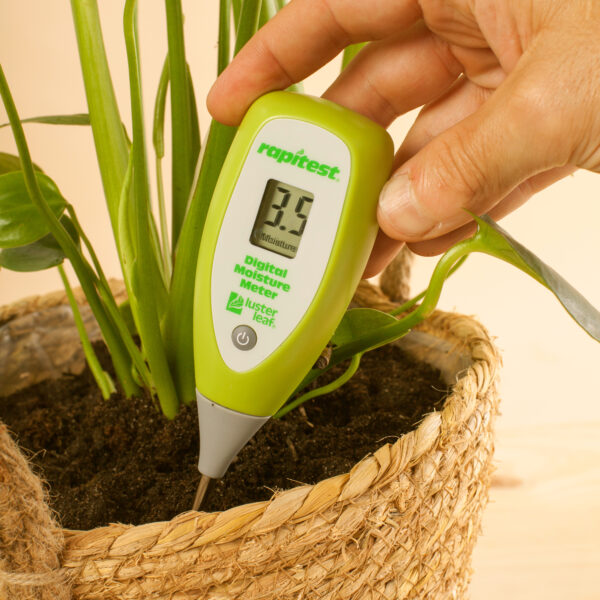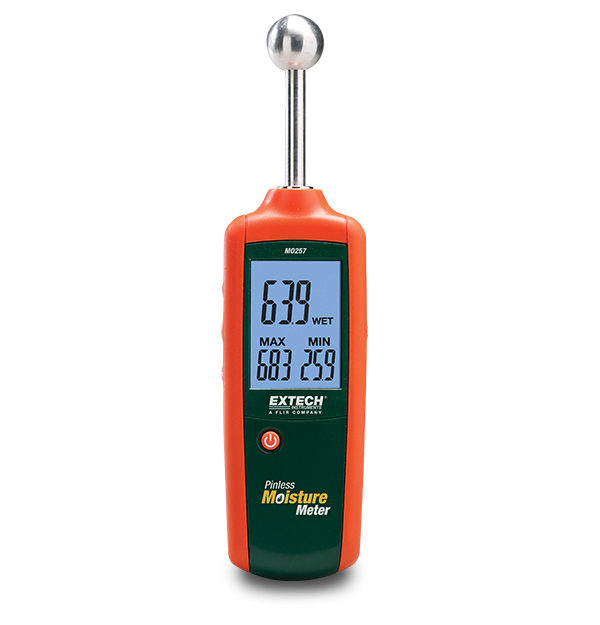The Ultimate Overview to Dampness Meters: A Comprehensive Summary and How They Can Conserve You Cash
Moisture meters serve as crucial tools in finding and monitoring moisture material in products, assisting in preventing costly damages and ensuring the quality of products. Recognizing the nuances of different types of wetness meters, their applications, and the potential cost-saving benefits they use can be a game-changer for experts and organizations alike.
Kinds Of Moisture Meters
Different kinds of dampness meters are available for different applications in different sectors. One usual kind is the pin-type moisture meter, which measures the electrical resistance between two pins placed right into a product. This kind is ideal for wood, drywall, and other building materials. Pinless moisture meters, on the other hand, use electromagnetic sensor plates to scan a larger area without triggering damage to the product's surface. Moisture Meter. These meters are suitable for promptly analyzing dampness degrees in huge locations such as wall surfaces and floors.

Additionally, there are additionally specialty wetness meters made for details products like grain, soil, or hay. These meters supply accurate moisture analyses customized to the distinct residential properties of the product being tested. Infrared moisture meters gauge the thermal homes of a product to establish its wetness material non-invasively, making them beneficial for applications where pin or pinless meters may not appropriate. Comprehending the various kinds of moisture meters readily available can help sectors choose one of the most suitable device for their certain moisture measurement demands.

Advantages of Utilizing Dampness Meters
Wetness meters supply invaluable benefits in properly keeping an eye on and evaluating dampness degrees in varied materials and atmospheres. One of the primary advantages of making use of wetness meters is the prevention of prospective damage created by excess wetness.
Moreover, utilizing moisture meters can bring about raised power performance. By identifying locations with high moisture levels, such as leaks or poor insulation, changes can be made to improve energy preservation and lower energy prices. In farming settings, dampness meters play an essential role in optimizing plant returns by allowing farmers to monitor dirt wetness levels and make educated irrigation decisions. Overall, the benefits of making use of dampness meters extend across different markets, offering affordable options and promoting much better quality assurance methods.
How to Select the Right Wetness Meter
When choosing a wetness meter, it's vital to ensure that the meter is ideal for the specific product you will be testing. Various materials have differing electrical residential or commercial properties that can affect wetness analyses, so picking a meter made for your product is essential for accurate outcomes. By meticulously examining these elements, you can select a moisture meter that fulfills your requirements and gives precise moisture dimensions for your jobs.
Proper Methods for Moisture Meter Use

Expense Financial Savings With Moisture Meter Applications
Just how can the calculated application of dampness meters cause considerable cost savings across different sectors? Dampness meters play a crucial duty in cost financial savings by avoiding prospective damage and guaranteeing high quality control in various markets. In the farming market, dampness meters help in identifying the ideal time for harvesting plants, preventing over-drying or excess wetness that can affect the final item's top quality. This accurate monitoring assists farmers stay clear of unnecessary losses and optimize their yield.
In a similar way, in building, moisture meters aid stop pricey problems by discovering wetness degrees in structure materials, such as wood or concrete, which Full Article can bring about structural issues if not attended to promptly. By determining trouble areas early, contractors can take restorative procedures to stay clear of comprehensive repair services or substitutes, ultimately saving time and cash.
In addition, in the food processing market, dampness meters are important for keeping an eye on item top quality and ensuring compliance with security guidelines. By properly measuring wetness material in food, suppliers can prevent spoilage, maintain freshness, and lower waste, causing significant cost savings. Overall, the strategic application of moisture meters is an important investment that can result in significant price decreases and enhanced effectiveness across different industries.
Conclusion
Finally, dampness meters are beneficial tools for gauging and finding wetness degrees in numerous materials. By making use of the appropriate wetness meter and following appropriate click to investigate strategies, users can properly protect against pricey damages brought on by excess dampness. Buying a high quality dampness meter can cause significant expense financial savings in the future by identifying potential concerns beforehand and making it possible for timely removal. Ultimately, dampness meters blog here are essential tools for maintaining the integrity and longevity of frameworks and products.
Wetness meters serve as essential devices in discovering and keeping track of moisture web content in materials, helping in protecting against costly problems and guaranteeing the top quality of products. Infrared moisture meters determine the thermal residential properties of a product to determine its wetness web content non-invasively, making them helpful for applications where pin or pinless meters might not be ideal.Moisture meters use indispensable benefits in properly evaluating and keeping an eye on wetness levels in varied products and settings. In farming setups, moisture meters play an important duty in optimizing crop yields by enabling farmers to keep track of soil wetness levels and make notified irrigation decisions.In final thought, moisture meters are valuable tools for spotting and determining dampness levels in various materials.